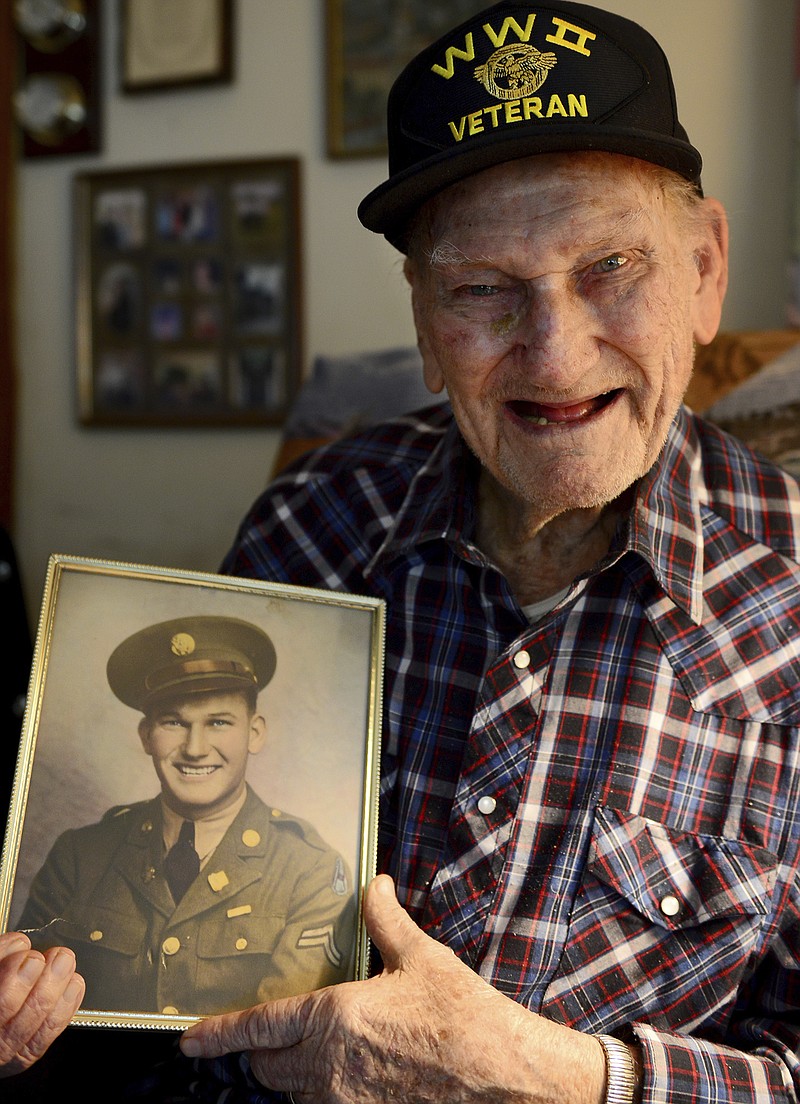JACKSON, Tenn. (AP) - After seeing his uncle's $21 check from the National Guard, 17-year-old Raymond Osborne wanted to leave his job as a farmer on his family's farm in Jackson and join the Army National Guard in 1940.
The only problem was, Osborne could not legally join the Guard until he was 18.
Instead of waiting, Osborne's uncle told him he could probably tell them he was 18 and they would let him join.
And that's exactly what happened.
"I lied about my age and went off into the war," Osborne said.
The United States had not entered World War II at the time, but President Franklin Roosevelt had begun mobilizing five Army divisions in the Mid-South because he knew entering the war was inevitable - and the United States was not prepared, Osborne said.
Osborne went with his Army division to Fort Bennett, Georgia, to begin training for two weeks, and then to Louisiana for another week.
When they returned in July 1940, trains were waiting for them as Osborne's Army division traveled to Fort Jackson, South Carolina. Training for the war took his division about three years, and living conditions were far from ideal.
"When we got there we were sleeping in tents," Osborne said. "There were no facilities for us to sleep in, so we were sleeping in tents and then the carpenters came out and built a platform and put the tent on top of it. A little better flooring and a few months later when another group came in - they built 14 barracks (to sleep on)."
In 1943, Osborne and his division made the voyage from New York to England, on a convoy with 50 boats, to begin preparing for the D-Day invasion.
"They told us everything was going to be all right because Germany wasn't prepared to take us and there wasn't going to be any fighting on the way there," he said.
Osborne's division trained in England for six months before invading Normandy, France, on D-Day in 1944. His division was part of D-Day Plus-5, meaning his division invaded Normandy five days after the initial invasion.
"You never knew what you were going to run into," Osborne said. "When you take off from this town and are headed to the other town, that's where we would fight, and you didn't know what they had up there. You would send the rifle troops, and they sat back in this town to prepare for the fire in another town."
The United States' invasion of Normandy was successful and the war soon turned in favor of the Allies - and within 11 months of Osborne's unit arriving in Europe the Allies had retaken all the land the Nazis had overtaken in the past few years. In 1945, Nazi Germany surrendered to the Allies.
In true heroic fashion, Osborne said he does not remember why he was awarded the Bronze Star for his service during the war.
His son Danny Osborne said he believes Raymond was a recipient of the Bronze Star for one of two reasons.
"They had a lot of German troops at the bottom of a cliff and they were shelling them, so the colonel asked Daddy to drop some shells on the Germans who were at the bottom of that cliff," Danny said. "He had to check the guns twice. It looked like he was going to shoot straight up and straight back down on them. They wiped them out and moved on."
But Danny said he believes the scenario involving a farmhouse in Germany is the most likely one.
"The Germans had a machine gun firing on our troops and we couldn't move," Danny said. "He had actually sent a lieutenant to observe them so they could drop some mortars. The lieutenant went hiding, so the colonel grabbed Daddy and told him to observe the farm, and he did. They were able to drop mortars on the house and let us move forward. That saved a lot of lives."
Raymond, 95, said being involved in World War II brought him closer to God.
"You're scared and you talk a lot to the man up yonder to protect you," Raymond said. "Lord help me. Many times did you pray (to God) - and he helped."
___
Information from: The Jackson Sun, http://www.jacksonsun.com
